THE GREAT GATSBY
Best Book Clubs
,
Best Book Deals
,
Best Book Sites and Apps
,
Classic Reads
,
Free Audio Books
,
Free Kindle Books
1 comment
:
BOOK REVIEW
PLOT SUMMARY
PLOT SUMMARY
This modernist novel of manners by F. Scott Fitzgerald is published by Scribner Classics, a division of the MacMillan Reference Library (but is licensed to other publishers and is in the public domain, but only in countries outside of the United States). This book is written for adults, yet it is often studied in high school during 11th grade.
PLOT SUMMARY
After graduating from college and serving in the first World War, Nick Caraway, the narrator of this story, gets a job as a bonds broker in New York City. He rents a bungalow outside of the city, on the less fashionable side of Long Island Sound called West Egg. His second cousin Daisy who lives with her husband, Tom, in East Egg is unhappy in her marriage, but she enjoys being rich. Daisy introduces Nick to Jordan Baker, a famous golf star, but Jordan has a problem with lying.
Nick travels to work by train. One day Tom introduces Nick to his mistress, Myrtle Wilson, who is married to a mechanic in the area. They go to the city on the train and end up at an apartment Tom owns. Nick meets the neighbors, and they all get drunk.
Nick is eventually invited to one of the many parties thrown by his neighbor Jay Gatsby. Nick finds Jordan at the party and decides that he doesn't mind her dishonesty, even though he is a very honest person. Before he becomes involved with her, Nick decides he must first break off his relationship with a girl back home.
Gatsby, as everyone calls his neighbor, changed his name from James Gatz when he was 17. He is extremely wealthy, and there are rumors about his background, but no one knows exactly where he's from or how he got his money. Nick later learns that Gatsby worked for Dan Cody, who made millions, and he was promised $25,000 at the man's death. Gatsby never received a penny, though, because Cody's wife finagled the situation. The story hints that Gatsby is a bootlegger.
Gatsby throws extravagant parties most nights during the summer. Rich and famous people come from all over the state to attend. Gatsby's parties are so well known that one day a reporter appears on his porch and asks for a comment. The man doesn't know exactly who Gatsby is or what he does but, because his name is bandied about by all the right people, the reporter believes he's on the edge of something newsworthy — though he has no idea what that might be.
Gatsby and Nick slowly get to know each other. Jordan tells Nick how Gatsby used to know Daisy before she married Tom. Gatsby is still in love with Daisy, and he asks Nick to invite Daisy over to Nick's house for tea. When Nick does, Gatsby and Daisy slowly become reacquainted, first at Nick's house and then at Gatsby's. Gatsby has waited five years to see Daisy again; he has to adjust his thoughts to the reality of her presence.
Daisy and Tom are invited to one of Gatsby's parties. Daisy is fascinated by it, but she doesn't seem to have a good time. Soon after, Gatsby no longer throws parties and lets his staff go. He hires a tougher, smaller crowd to take care of his house so Daisy can visit in the afternoons.
Nick and Gatsby are invited to Tom's house one afternoon. When Tom leaves the room, Daisy kisses Gatsby and says she loves him. Jordan says that Tom is talking to his mistress, Myrtle. In the midst of this, Daisy and Tom's daughter is introduced to the guests.
Later, Nick, Gatsby, Tom, Jordan and Daisy go for a drive to the city. When they fill up with gas, Nick learns that Mr. Wilson (Myrtle's husband) is upset with his wife. He thinks she has been having an affair, but he doesn't know with whom. At the same time, Tom realizes that Daisy has a life beyond her life with him. He doesn't like this idea.
LONDON
London. Michaelmas term lately over, and the Lord Chancellor sitting in Lincoln's Inn Hall. Implacable November weather. As much mud in the streets as if the waters had but newly retired from the face of the earth, and it would not be wonderful to meet a Megalosaurus, forty feet long or so, waddling like an elephantine lizard up Holborn Hill.London. Michaelmas term lately over, and the Lord Chancellor sitting in Lincoln's Inn Hall. Implacable November weather. As much mud in the streets as if the waters had but newly retired from the face of the earth, and it would not be wonderful to meet a Megalosaurus, forty feet long or so, waddling like an elephantine lizard up Holborn Hill.London. Michaelmas term lately over, and the Lord Chancellor sitting in Lincoln's Inn Hall. Implacable November weather. As much mud in the streets as if the waters had but newly retired from the face of the earth, and it would not be wonderful to meet a Megalosaurus, forty feet long or so, waddling like an elephantine lizard up Holborn Hill.London. Michaelmas term lately over, and the Lord Chancellor sitting in Lincoln's Inn Hall. Implacable November weather. As much mud in the streets as if the waters had but newly retired from the face of the earth, and it would not be wonderful to meet a Megalosaurus, forty feet long or so, waddling like an elephantine lizard up Holborn Hill.London. Michaelmas term lately over, and the Lord Chancellor sitting in Lincoln's Inn Hall. Implacable November weather. As much mud in the streets as if the waters had but newly retired from the face of the earth, and it would not be wonderful to meet a Megalosaurus, forty feet long or so, waddling like an elephantine lizard up Holborn Hill.London. Michaelmas term lately over, and the Lord Chancellor sitting in Lincoln's Inn Hall. Implacable November weather. As much mud in the streets as if the waters had but newly retired from the face of the earth, and it would not be wonderful to meet a Megalosaurus, forty feet long or so, waddling like an elephantine lizard up Holborn Hill.London. Michaelmas term lately over, and the Lord Chancellor sitting in Lincoln's Inn Hall. Implacable November weather. As much mud in the streets as if the waters had but newly retired from the face of the earth, and it would not be wonderful to meet a Megalosaurus, forty feet long or so, waddling like an elephantine lizard up Holborn Hill.
Sample Post 5
The Left Hand of Darkness by Ursula K. Le Guin
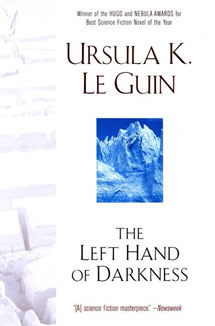
Not only is The Left Hand of Darkness a masterpiece of ideas, invention, and language, but it takes conventional assumptions about gender and grinds them into a fine, powdery dust. Published in 1969, the book won both the Hugo and Nebula Awards and went on to become one of the keystones of science fiction. It tells the story of an ethnologist sent to another planet, but it is Le Guin's powers of imagination that turn The Left Hand of Darkness into something truly transcendent. – Mary Jo S.
Lolita by Vladimir Nabokov

Why should everyone read a book about a pedophile's obsessive and frankly gross relationship with a little girl? Because if you are a reader — a lover of words, puns, witticisms, metaphors, and allusions — Lolita is a literary masterpiece that can't be passed over in a fit of queasy morality. Humbert Humbert, the novel's unreliable narrator, knows that he's a despicable pervert and yet the reader can't help enjoying him as he surveys post-war America and little Lolita with the droll, cynical eye of a European expat adrift in a tawdry nation, and stuck irrevocably — and irredeemably — in the memory of an adolescent love affair. Please, ignore the critics: Lolita isn't a morality tale and it isn't a love story. It's an unabashed look at a deviant mind written in some of the most deft and beautiful English ever published. – Rhianna W.
Man's Search for Meaning by Viktor E. Frankl
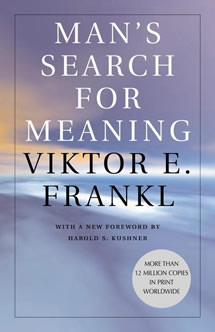
Man's Search for Meaning is like nothing you've ever read before. The first half of the book depicts Dr. Frankl's four years losing everything in concentration camps — a description so hellish, it leaves you desolate. Shattered by his Holocaust experiences, Frankl struggles to survive after he is freed. In the second half of the book, Frankl shows how that period of his life informs and develops his theory of "logotherapy" — he asserts that life is about finding meaning, what is meaningful to each individual. As excruciating as his experiences are, Frankl's theory is full of love; he is able to find redemption for himself and others. This book is beautifully life-changing. – Dianah H.
Sample Post 4
The Hitchhiker's Guide to the Gala by Douglas Adams
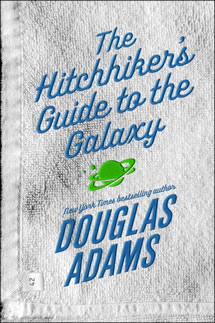
Parodying practically every well-worn sci-fi plot device in existence, Adams's Hitchhiker's Guide to the Galaxy has become a classic in its own right. A hapless hero with astonishing luck? Ill-tempered aliens hell-bent on destroying Earth? Pithy advice (e.g., "DON'T PANIC")? Check, check, and check — and so much more. Even non–sci-fi geeks will be charmed by this hilarious and endlessly entertaining read, with (of course) sequels following. – Jen C.
If on a Winter's Night a Traveler by Italo Calvino
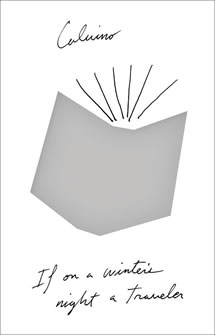
For those with an amorous affair with books, If on a Winter's Night a Traveler may well be the ultimate love letter to the reader. Calvino's novel is a masterfully created, startlingly unique work of fiction. Told alternately in second- and third-person narratives, the book is a fascinating exploration of the relationship between the author and the reader — weaving together seemingly unrelated tales, all of which relate directly to you, the reader. At its core is an ingenious concept the likes of which could have only come from the unparalleled imagination of Calvino. By the time you reach its dazzling conclusion, you'll be wishing you could somehow read it again for the very first time. – Jeremy G.
Infinite Jest by David Foster Wallace
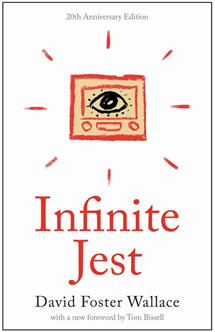
Infinite Jest is unique; it was bred in the optimism and new frontiersmanship of the dot-com 1990s but was simultaneously an early omen of where we are today. It looks into our present beyond what were only horizons when it was written: the tensions of a global economy, the opiate of on-demand entertainment, the near-impossible pursuit of greatness in a winner-take-all society. Tennis phenoms struggle in an absurdly demanding academy and recovering addicts search for something strong enough to help them through, all while a cadre of legless Quebecois assassins search for a movie so entertaining that they plan to use it as a weapon. At turns madcap and heart-wrenching, this is the tour-de-force novel of the forces that have shaped our new millennium and will likely continue shaping it for decades to come. – Tye P.
Sample Post 3
Giovanni's Room by James Baldwin
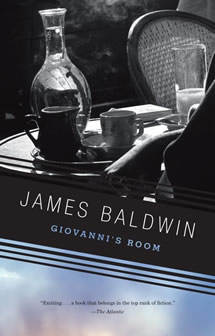
It would be difficult to talk about James Baldwin's Giovanni's Room and not touch on the simple fact that this slim novel, published in 1956, is mainly a love story between two men. It seems impossible to think such a thing could be published pre-Stonewall, but such is the genius of Baldwin and the way he captures the complexities of desire, love, and the tragic cost that comes from not following your heart. "Somebody…should have told us that not many people have ever died of love. But multitudes have perished…for the lack of it." This emotional wonder of a book comes down to two things: love and death. And really, what else is there in life? – Kate F.
A Good Man Is Hard to Find and Other Stories by Flannery O'Connor
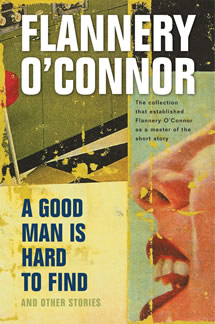
Flannery O'Connor's first short story collection, written in 1955, will knock you off your feet. Ruthless, penetrating, and loaded with subtext, A Good Man Is Hard to Find and Other Stories was brave for its time and feels just as consequential today. Writing in the Southern Gothic tradition in a style wholly her own, O'Connor creates characters that are misguided, stunted curiosities, but she manages to capture what's human in even the most despicable of people — which makes their doomed trajectories feel all the more tragic. And despite the disturbing events that unfold, the stories are a pleasure to read — they're infused with suspense, dark humor, and some of the most evocative imagery you'll encounter in literature. All this makes for a collection that never ceases to amaze — and begs to be reread. – Renee P.
The Handmaid's Tale by Margaret Atwood
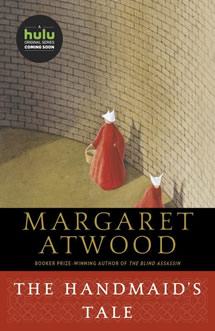
Atwood's classic dystopian novel of a terrifying (and terrifyingly plausible) future America has rewarded rereading like no other book; I've probably read it 30 times by now. The world of the narrator, Offred (from "Of Fred" — women no longer have their own names), is chilling, but she is a magnificent survivor and chronicler, and the details of everything from mundane daily life to ritualized sex and violence to her reminiscences of the time before (our contemporary reality, as seen in the '80s) are absolutely realistic. The novel is as relevant today as ever; feminist backlashes continue to wax and wane, but women's rights remain in the spotlight. And despite its scenarios of great despair, The Handmaid's Taleis ultimately a hopeful book — Offred, and others, simply cannot be human without the possibility of hope, and therein lies the strength of the resistance. All of Atwood is worth reading, but this book best exemplifies the cultural and psychological impact that a work of fiction can create. – Jill O.
Sample Post 2
Disgrace by J. M. Coetzee
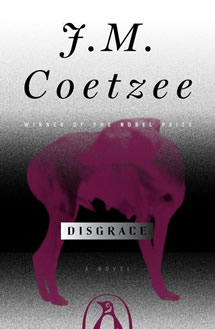
One afternoon while talking with a friend about books, I wondered how to best describe my experience of reading Disgrace, and this is what I came up with: it's like a finely crafted, very sharp knife resting gently against your skin. The uneasiness and suspense are there from the beginning, made all the more powerful by Coetzee's control and use of spare language, and you never really take a deep breath until it's all over. Set in modern South Africa, the book explores what it's like to personally confront deep prejudices. Prejudices of gender, sexuality, class, and race. Far from being a politically correct diatribe, this novel is about how we cope, how we survive as humans, and it forces the reader to reflect upon what seems at first a very twisted reality. For each of the characters in this astonishing novel, redemption is attained through what becomes the very reshaping of their souls. – Rebecca
Geek Love by Katherine Dunn
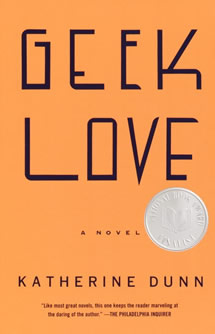
This is the book I recommend more than any other — I can barely hold onto a copy of it because I am always giving it away to anyone who I think needs something that will blow the top of their skull off. On one level, it is the engaging, creepy, and extraordinary story of a family of purposely designed circus freaks, as told by the hunchback albino dwarf sister. On another level, it is a story about identity and belonging: How do you define yourself in terms of your family? Your culture? Your body? Your religion? How do you know what or who you really are? – Lizzy A.
Gilead by Marilynne Robinson
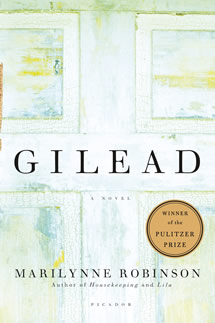
Set in 1956, Marilynne Robinson's Gilead is a letter from the elderly Reverend John Ames to his very young son. Ames has lived all of his life in Gilead, Iowa, and the novel delves into the history of the area through the characters of Ames's father and grandfather — also ministers, but deeply divided on ideas such as pacifism, duty, and the abolitionist movement. And eventually, when John Ames Boughton, Ames's namesake and godson, returns to Gilead, he brings up old tensions and sets events in motion that disturb Ames's formerly peaceful last days. Gilead is one of the most beautifully written books of the new century thus far, and Robinson's incredibly insightful grappling with faith, mortality, and what constitutes a meaningful life will resonate with readers across every spectrum. – Jill O.
Sample Article 1
2666 by Roberto Bolaño
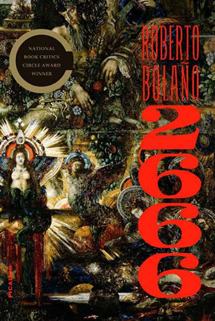
Completed in 2003 shortly before his death, 2666 is not only Roberto Bolaño's masterpiece but also one of the finest and most important novels of the 21st century. It's an entire world unto itself, one — not unlike our own — filled with horror, neglect, depravity, brilliance, and beauty. Epic in scope and epitomizing the "total novel," 2666 fuses many different genres and styles to create a singular and unforgettable work of contemporary fiction. While Bolaño's swan song marked the pinnacle of a sadly truncated literary career, his immense talent, creativity, and vision endure. – Jeremy G.
All About Love by bell hooks

We're taught to think of love as something that happens to us. It's a magical but altogether passive experience. In her deeply personal and emphatic All About Love, renowned social activist and feminist bell hooks asserts that, in fact, love is a choice we must all make and it's not nearly as abstract or elusive as many of us have come to believe. The book not only explores the role of love in our lives and the ways our culture has distorted its meaning, but guides us — with clear definitions and examples — toward a better understanding of how to cultivate it. If you've ever wondered why some relationships stand the test of time while others crumble, you should read this book. – Renee P.
Desert Solitaire by Edward Abbey
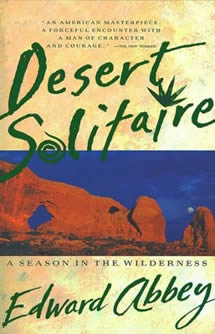
No author encapsulated and celebrated the American Southwest more engagingly than iconoclast and raconteur Edward Abbey. Desert Solitaire: A Season in the Wilderness — now nearly a half-century old — is a classic of environmental writing. In this autobiographical work, Abbey chronicles his time as a park ranger and reflects on landscape, culture, politics, tourism, environmental disregard, and degradation — doing so with a unique blend of ornery charm and breathtaking description. Though set in his beloved Southwest, Desert Solitaire beautifully and brashly captures the essence of the American outdoors, replete with disdain for those who'd seek to spoil its natural wonder. – Jeremy G.
Subscribe to:
Comments
(
Atom
)












